Legal Framework and Solutions: A Business Law Report (Semester 1)
VerifiedAdded on 2020/06/06
|10
|2826
|41
Report
AI Summary
This report provides an overview of the English legal system, exploring its nature and sources of law, including primary and secondary legislation, case law, parliamentary conventions, and common law. It examines the function of legal authorities in the law-making process, detailing the stages from bill proposal to enactment. The report further investigates the impact of consumer and employment law on businesses, analyzing the influence of consumer rights and employment legislation on company policies, practices, and relationships. Additionally, it explains the nature of registered companies, the roles of directors, and the processes involved in company registration, along with identifying ways registered companies can raise capital. Finally, it explores and evaluates alternative dispute resolutions, including solutions based on the country's legal system.
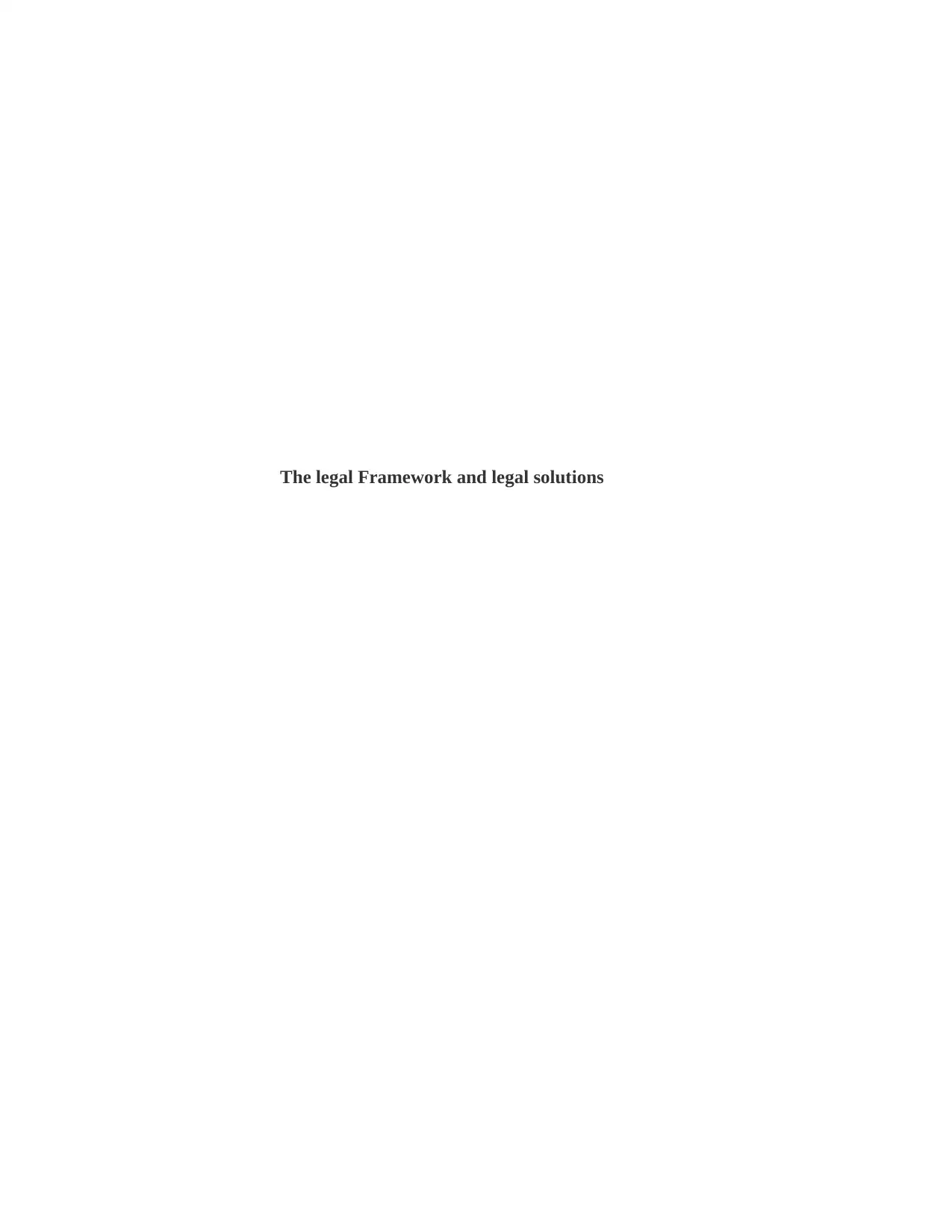
The legal Framework and legal solutions
Paraphrase This Document
Need a fresh take? Get an instant paraphrase of this document with our AI Paraphraser
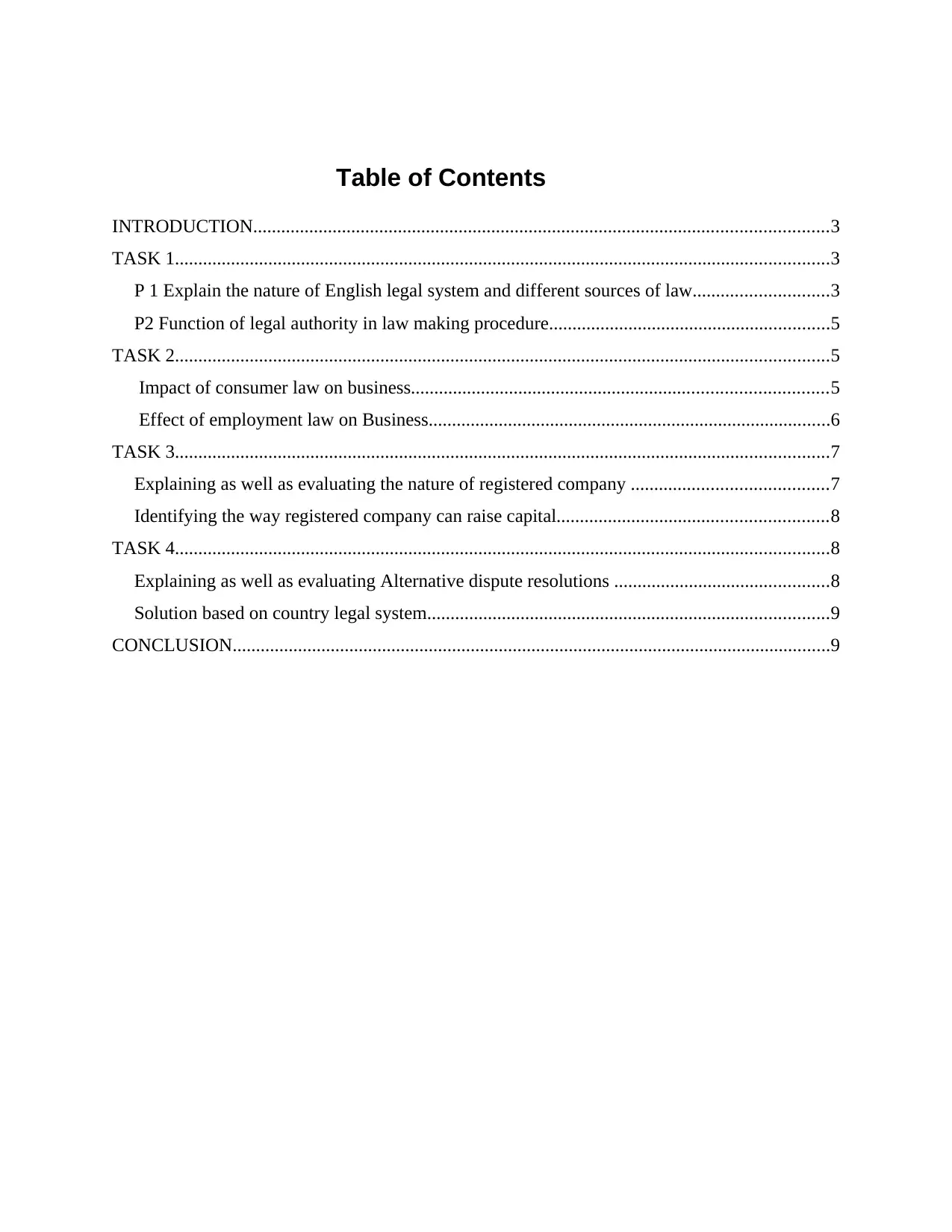
Table of Contents
INTRODUCTION...........................................................................................................................3
TASK 1............................................................................................................................................3
P 1 Explain the nature of English legal system and different sources of law.............................3
P2 Function of legal authority in law making procedure............................................................5
TASK 2............................................................................................................................................5
Impact of consumer law on business.........................................................................................5
Effect of employment law on Business......................................................................................6
TASK 3............................................................................................................................................7
Explaining as well as evaluating the nature of registered company ..........................................7
Identifying the way registered company can raise capital..........................................................8
TASK 4............................................................................................................................................8
Explaining as well as evaluating Alternative dispute resolutions ..............................................8
Solution based on country legal system......................................................................................9
CONCLUSION................................................................................................................................9
INTRODUCTION...........................................................................................................................3
TASK 1............................................................................................................................................3
P 1 Explain the nature of English legal system and different sources of law.............................3
P2 Function of legal authority in law making procedure............................................................5
TASK 2............................................................................................................................................5
Impact of consumer law on business.........................................................................................5
Effect of employment law on Business......................................................................................6
TASK 3............................................................................................................................................7
Explaining as well as evaluating the nature of registered company ..........................................7
Identifying the way registered company can raise capital..........................................................8
TASK 4............................................................................................................................................8
Explaining as well as evaluating Alternative dispute resolutions ..............................................8
Solution based on country legal system......................................................................................9
CONCLUSION................................................................................................................................9
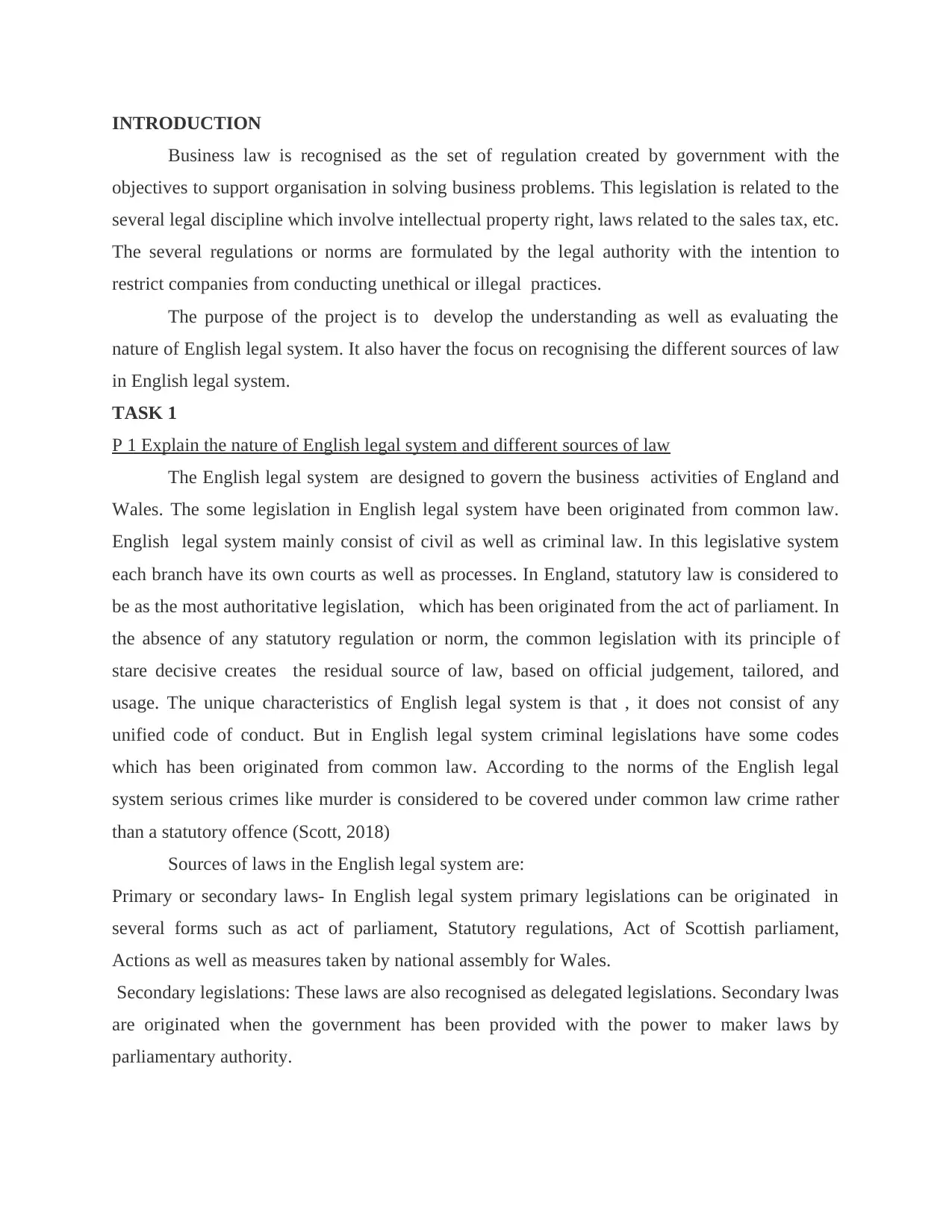
INTRODUCTION
Business law is recognised as the set of regulation created by government with the
objectives to support organisation in solving business problems. This legislation is related to the
several legal discipline which involve intellectual property right, laws related to the sales tax, etc.
The several regulations or norms are formulated by the legal authority with the intention to
restrict companies from conducting unethical or illegal practices.
The purpose of the project is to develop the understanding as well as evaluating the
nature of English legal system. It also haver the focus on recognising the different sources of law
in English legal system.
TASK 1
P 1 Explain the nature of English legal system and different sources of law
The English legal system are designed to govern the business activities of England and
Wales. The some legislation in English legal system have been originated from common law.
English legal system mainly consist of civil as well as criminal law. In this legislative system
each branch have its own courts as well as processes. In England, statutory law is considered to
be as the most authoritative legislation, which has been originated from the act of parliament. In
the absence of any statutory regulation or norm, the common legislation with its principle of
stare decisive creates the residual source of law, based on official judgement, tailored, and
usage. The unique characteristics of English legal system is that , it does not consist of any
unified code of conduct. But in English legal system criminal legislations have some codes
which has been originated from common law. According to the norms of the English legal
system serious crimes like murder is considered to be covered under common law crime rather
than a statutory offence (Scott, 2018)
Sources of laws in the English legal system are:
Primary or secondary laws- In English legal system primary legislations can be originated in
several forms such as act of parliament, Statutory regulations, Act of Scottish parliament,
Actions as well as measures taken by national assembly for Wales.
Secondary legislations: These laws are also recognised as delegated legislations. Secondary lwas
are originated when the government has been provided with the power to maker laws by
parliamentary authority.
Business law is recognised as the set of regulation created by government with the
objectives to support organisation in solving business problems. This legislation is related to the
several legal discipline which involve intellectual property right, laws related to the sales tax, etc.
The several regulations or norms are formulated by the legal authority with the intention to
restrict companies from conducting unethical or illegal practices.
The purpose of the project is to develop the understanding as well as evaluating the
nature of English legal system. It also haver the focus on recognising the different sources of law
in English legal system.
TASK 1
P 1 Explain the nature of English legal system and different sources of law
The English legal system are designed to govern the business activities of England and
Wales. The some legislation in English legal system have been originated from common law.
English legal system mainly consist of civil as well as criminal law. In this legislative system
each branch have its own courts as well as processes. In England, statutory law is considered to
be as the most authoritative legislation, which has been originated from the act of parliament. In
the absence of any statutory regulation or norm, the common legislation with its principle of
stare decisive creates the residual source of law, based on official judgement, tailored, and
usage. The unique characteristics of English legal system is that , it does not consist of any
unified code of conduct. But in English legal system criminal legislations have some codes
which has been originated from common law. According to the norms of the English legal
system serious crimes like murder is considered to be covered under common law crime rather
than a statutory offence (Scott, 2018)
Sources of laws in the English legal system are:
Primary or secondary laws- In English legal system primary legislations can be originated in
several forms such as act of parliament, Statutory regulations, Act of Scottish parliament,
Actions as well as measures taken by national assembly for Wales.
Secondary legislations: These laws are also recognised as delegated legislations. Secondary lwas
are originated when the government has been provided with the power to maker laws by
parliamentary authority.
⊘ This is a preview!⊘
Do you want full access?
Subscribe today to unlock all pages.

Trusted by 1+ million students worldwide
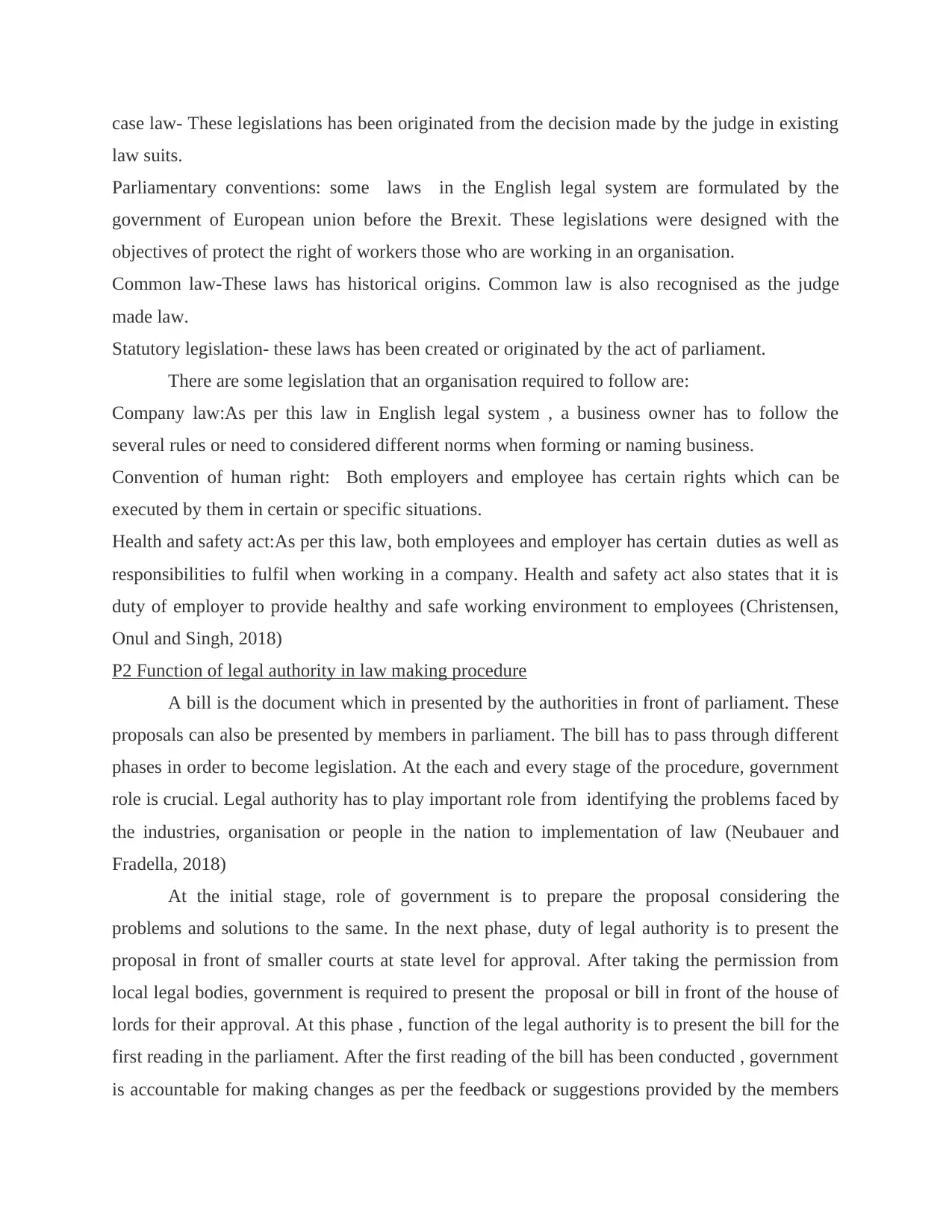
case law- These legislations has been originated from the decision made by the judge in existing
law suits.
Parliamentary conventions: some laws in the English legal system are formulated by the
government of European union before the Brexit. These legislations were designed with the
objectives of protect the right of workers those who are working in an organisation.
Common law-These laws has historical origins. Common law is also recognised as the judge
made law.
Statutory legislation- these laws has been created or originated by the act of parliament.
There are some legislation that an organisation required to follow are:
Company law:As per this law in English legal system , a business owner has to follow the
several rules or need to considered different norms when forming or naming business.
Convention of human right: Both employers and employee has certain rights which can be
executed by them in certain or specific situations.
Health and safety act:As per this law, both employees and employer has certain duties as well as
responsibilities to fulfil when working in a company. Health and safety act also states that it is
duty of employer to provide healthy and safe working environment to employees (Christensen,
Onul and Singh, 2018)
P2 Function of legal authority in law making procedure
A bill is the document which in presented by the authorities in front of parliament. These
proposals can also be presented by members in parliament. The bill has to pass through different
phases in order to become legislation. At the each and every stage of the procedure, government
role is crucial. Legal authority has to play important role from identifying the problems faced by
the industries, organisation or people in the nation to implementation of law (Neubauer and
Fradella, 2018)
At the initial stage, role of government is to prepare the proposal considering the
problems and solutions to the same. In the next phase, duty of legal authority is to present the
proposal in front of smaller courts at state level for approval. After taking the permission from
local legal bodies, government is required to present the proposal or bill in front of the house of
lords for their approval. At this phase , function of the legal authority is to present the bill for the
first reading in the parliament. After the first reading of the bill has been conducted , government
is accountable for making changes as per the feedback or suggestions provided by the members
law suits.
Parliamentary conventions: some laws in the English legal system are formulated by the
government of European union before the Brexit. These legislations were designed with the
objectives of protect the right of workers those who are working in an organisation.
Common law-These laws has historical origins. Common law is also recognised as the judge
made law.
Statutory legislation- these laws has been created or originated by the act of parliament.
There are some legislation that an organisation required to follow are:
Company law:As per this law in English legal system , a business owner has to follow the
several rules or need to considered different norms when forming or naming business.
Convention of human right: Both employers and employee has certain rights which can be
executed by them in certain or specific situations.
Health and safety act:As per this law, both employees and employer has certain duties as well as
responsibilities to fulfil when working in a company. Health and safety act also states that it is
duty of employer to provide healthy and safe working environment to employees (Christensen,
Onul and Singh, 2018)
P2 Function of legal authority in law making procedure
A bill is the document which in presented by the authorities in front of parliament. These
proposals can also be presented by members in parliament. The bill has to pass through different
phases in order to become legislation. At the each and every stage of the procedure, government
role is crucial. Legal authority has to play important role from identifying the problems faced by
the industries, organisation or people in the nation to implementation of law (Neubauer and
Fradella, 2018)
At the initial stage, role of government is to prepare the proposal considering the
problems and solutions to the same. In the next phase, duty of legal authority is to present the
proposal in front of smaller courts at state level for approval. After taking the permission from
local legal bodies, government is required to present the proposal or bill in front of the house of
lords for their approval. At this phase , function of the legal authority is to present the bill for the
first reading in the parliament. After the first reading of the bill has been conducted , government
is accountable for making changes as per the feedback or suggestions provided by the members
Paraphrase This Document
Need a fresh take? Get an instant paraphrase of this document with our AI Paraphraser
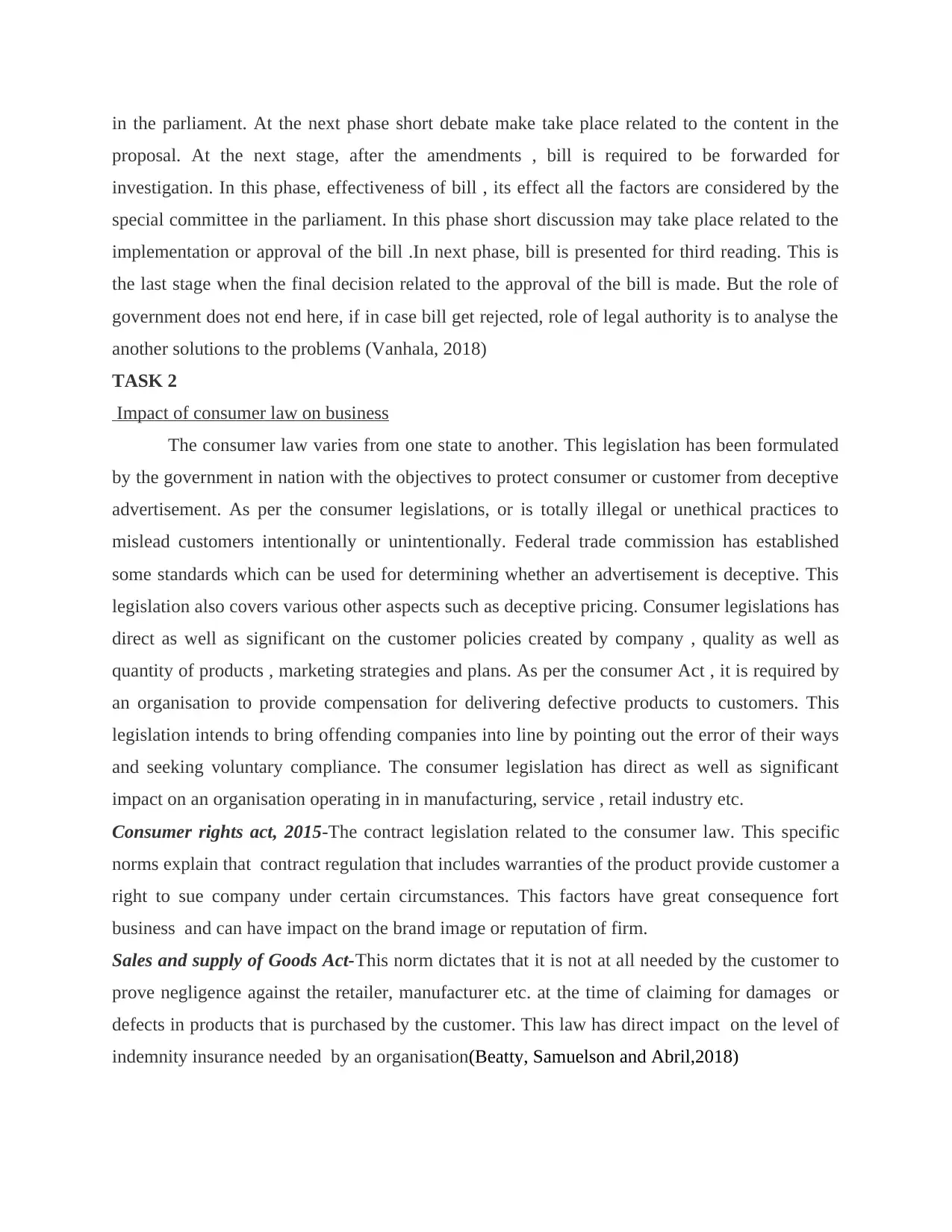
in the parliament. At the next phase short debate make take place related to the content in the
proposal. At the next stage, after the amendments , bill is required to be forwarded for
investigation. In this phase, effectiveness of bill , its effect all the factors are considered by the
special committee in the parliament. In this phase short discussion may take place related to the
implementation or approval of the bill .In next phase, bill is presented for third reading. This is
the last stage when the final decision related to the approval of the bill is made. But the role of
government does not end here, if in case bill get rejected, role of legal authority is to analyse the
another solutions to the problems (Vanhala, 2018)
TASK 2
Impact of consumer law on business
The consumer law varies from one state to another. This legislation has been formulated
by the government in nation with the objectives to protect consumer or customer from deceptive
advertisement. As per the consumer legislations, or is totally illegal or unethical practices to
mislead customers intentionally or unintentionally. Federal trade commission has established
some standards which can be used for determining whether an advertisement is deceptive. This
legislation also covers various other aspects such as deceptive pricing. Consumer legislations has
direct as well as significant on the customer policies created by company , quality as well as
quantity of products , marketing strategies and plans. As per the consumer Act , it is required by
an organisation to provide compensation for delivering defective products to customers. This
legislation intends to bring offending companies into line by pointing out the error of their ways
and seeking voluntary compliance. The consumer legislation has direct as well as significant
impact on an organisation operating in in manufacturing, service , retail industry etc.
Consumer rights act, 2015-The contract legislation related to the consumer law. This specific
norms explain that contract regulation that includes warranties of the product provide customer a
right to sue company under certain circumstances. This factors have great consequence fort
business and can have impact on the brand image or reputation of firm.
Sales and supply of Goods Act-This norm dictates that it is not at all needed by the customer to
prove negligence against the retailer, manufacturer etc. at the time of claiming for damages or
defects in products that is purchased by the customer. This law has direct impact on the level of
indemnity insurance needed by an organisation(Beatty, Samuelson and Abril,2018)
proposal. At the next stage, after the amendments , bill is required to be forwarded for
investigation. In this phase, effectiveness of bill , its effect all the factors are considered by the
special committee in the parliament. In this phase short discussion may take place related to the
implementation or approval of the bill .In next phase, bill is presented for third reading. This is
the last stage when the final decision related to the approval of the bill is made. But the role of
government does not end here, if in case bill get rejected, role of legal authority is to analyse the
another solutions to the problems (Vanhala, 2018)
TASK 2
Impact of consumer law on business
The consumer law varies from one state to another. This legislation has been formulated
by the government in nation with the objectives to protect consumer or customer from deceptive
advertisement. As per the consumer legislations, or is totally illegal or unethical practices to
mislead customers intentionally or unintentionally. Federal trade commission has established
some standards which can be used for determining whether an advertisement is deceptive. This
legislation also covers various other aspects such as deceptive pricing. Consumer legislations has
direct as well as significant on the customer policies created by company , quality as well as
quantity of products , marketing strategies and plans. As per the consumer Act , it is required by
an organisation to provide compensation for delivering defective products to customers. This
legislation intends to bring offending companies into line by pointing out the error of their ways
and seeking voluntary compliance. The consumer legislation has direct as well as significant
impact on an organisation operating in in manufacturing, service , retail industry etc.
Consumer rights act, 2015-The contract legislation related to the consumer law. This specific
norms explain that contract regulation that includes warranties of the product provide customer a
right to sue company under certain circumstances. This factors have great consequence fort
business and can have impact on the brand image or reputation of firm.
Sales and supply of Goods Act-This norm dictates that it is not at all needed by the customer to
prove negligence against the retailer, manufacturer etc. at the time of claiming for damages or
defects in products that is purchased by the customer. This law has direct impact on the level of
indemnity insurance needed by an organisation(Beatty, Samuelson and Abril,2018)
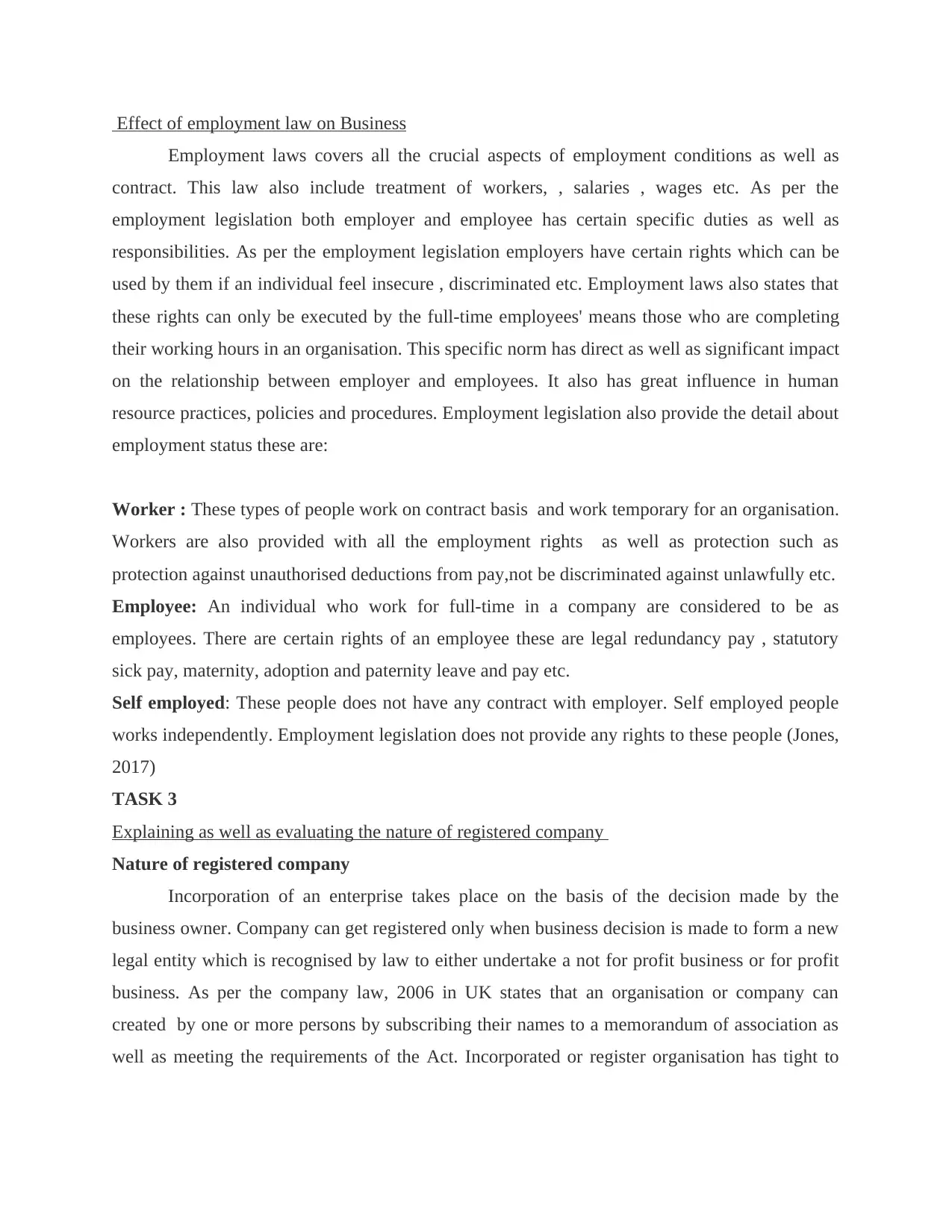
Effect of employment law on Business
Employment laws covers all the crucial aspects of employment conditions as well as
contract. This law also include treatment of workers, , salaries , wages etc. As per the
employment legislation both employer and employee has certain specific duties as well as
responsibilities. As per the employment legislation employers have certain rights which can be
used by them if an individual feel insecure , discriminated etc. Employment laws also states that
these rights can only be executed by the full-time employees' means those who are completing
their working hours in an organisation. This specific norm has direct as well as significant impact
on the relationship between employer and employees. It also has great influence in human
resource practices, policies and procedures. Employment legislation also provide the detail about
employment status these are:
Worker : These types of people work on contract basis and work temporary for an organisation.
Workers are also provided with all the employment rights as well as protection such as
protection against unauthorised deductions from pay,not be discriminated against unlawfully etc.
Employee: An individual who work for full-time in a company are considered to be as
employees. There are certain rights of an employee these are legal redundancy pay , statutory
sick pay, maternity, adoption and paternity leave and pay etc.
Self employed: These people does not have any contract with employer. Self employed people
works independently. Employment legislation does not provide any rights to these people (Jones,
2017)
TASK 3
Explaining as well as evaluating the nature of registered company
Nature of registered company
Incorporation of an enterprise takes place on the basis of the decision made by the
business owner. Company can get registered only when business decision is made to form a new
legal entity which is recognised by law to either undertake a not for profit business or for profit
business. As per the company law, 2006 in UK states that an organisation or company can
created by one or more persons by subscribing their names to a memorandum of association as
well as meeting the requirements of the Act. Incorporated or register organisation has tight to
Employment laws covers all the crucial aspects of employment conditions as well as
contract. This law also include treatment of workers, , salaries , wages etc. As per the
employment legislation both employer and employee has certain specific duties as well as
responsibilities. As per the employment legislation employers have certain rights which can be
used by them if an individual feel insecure , discriminated etc. Employment laws also states that
these rights can only be executed by the full-time employees' means those who are completing
their working hours in an organisation. This specific norm has direct as well as significant impact
on the relationship between employer and employees. It also has great influence in human
resource practices, policies and procedures. Employment legislation also provide the detail about
employment status these are:
Worker : These types of people work on contract basis and work temporary for an organisation.
Workers are also provided with all the employment rights as well as protection such as
protection against unauthorised deductions from pay,not be discriminated against unlawfully etc.
Employee: An individual who work for full-time in a company are considered to be as
employees. There are certain rights of an employee these are legal redundancy pay , statutory
sick pay, maternity, adoption and paternity leave and pay etc.
Self employed: These people does not have any contract with employer. Self employed people
works independently. Employment legislation does not provide any rights to these people (Jones,
2017)
TASK 3
Explaining as well as evaluating the nature of registered company
Nature of registered company
Incorporation of an enterprise takes place on the basis of the decision made by the
business owner. Company can get registered only when business decision is made to form a new
legal entity which is recognised by law to either undertake a not for profit business or for profit
business. As per the company law, 2006 in UK states that an organisation or company can
created by one or more persons by subscribing their names to a memorandum of association as
well as meeting the requirements of the Act. Incorporated or register organisation has tight to
⊘ This is a preview!⊘
Do you want full access?
Subscribe today to unlock all pages.

Trusted by 1+ million students worldwide
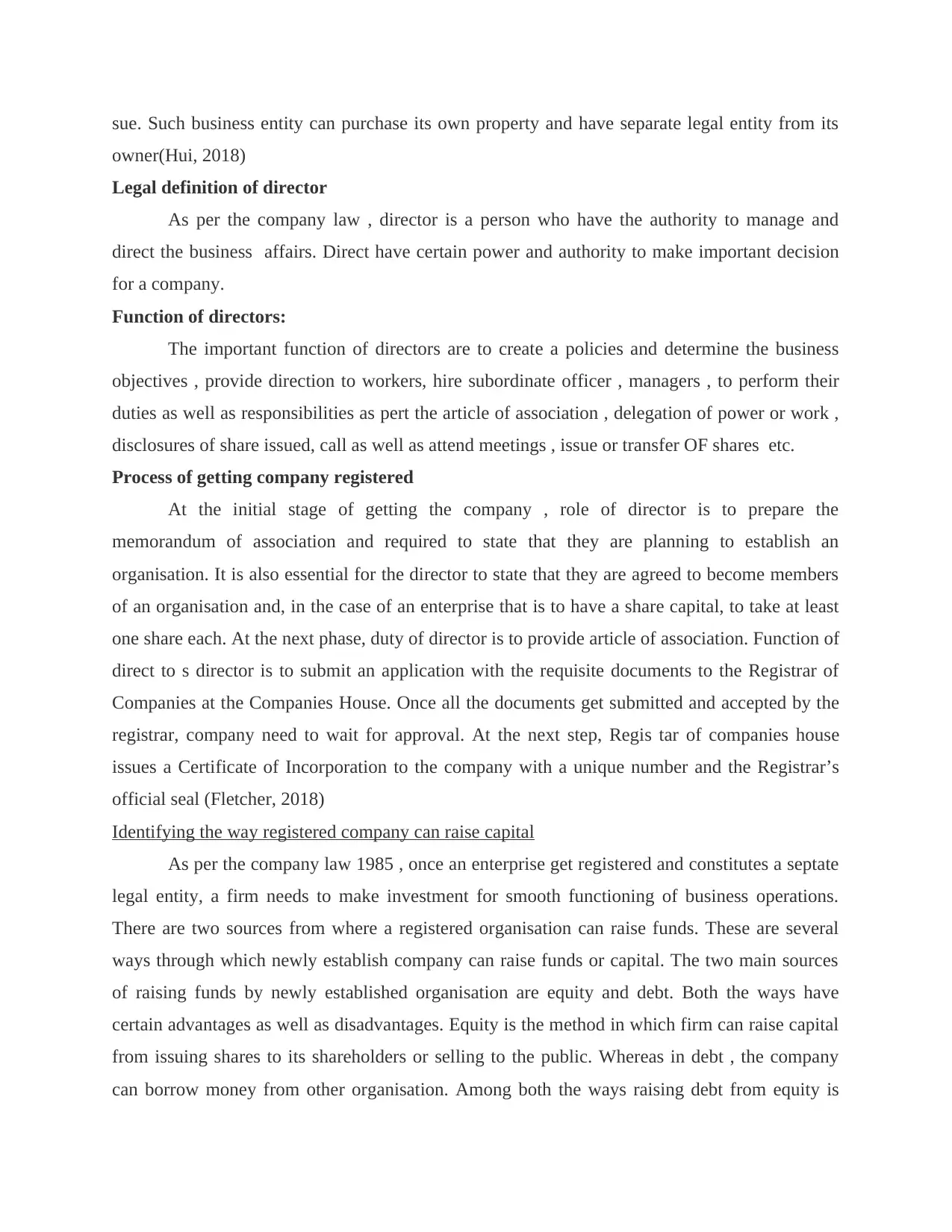
sue. Such business entity can purchase its own property and have separate legal entity from its
owner(Hui, 2018)
Legal definition of director
As per the company law , director is a person who have the authority to manage and
direct the business affairs. Direct have certain power and authority to make important decision
for a company.
Function of directors:
The important function of directors are to create a policies and determine the business
objectives , provide direction to workers, hire subordinate officer , managers , to perform their
duties as well as responsibilities as pert the article of association , delegation of power or work ,
disclosures of share issued, call as well as attend meetings , issue or transfer OF shares etc.
Process of getting company registered
At the initial stage of getting the company , role of director is to prepare the
memorandum of association and required to state that they are planning to establish an
organisation. It is also essential for the director to state that they are agreed to become members
of an organisation and, in the case of an enterprise that is to have a share capital, to take at least
one share each. At the next phase, duty of director is to provide article of association. Function of
direct to s director is to submit an application with the requisite documents to the Registrar of
Companies at the Companies House. Once all the documents get submitted and accepted by the
registrar, company need to wait for approval. At the next step, Regis tar of companies house
issues a Certificate of Incorporation to the company with a unique number and the Registrar’s
official seal (Fletcher, 2018)
Identifying the way registered company can raise capital
As per the company law 1985 , once an enterprise get registered and constitutes a septate
legal entity, a firm needs to make investment for smooth functioning of business operations.
There are two sources from where a registered organisation can raise funds. These are several
ways through which newly establish company can raise funds or capital. The two main sources
of raising funds by newly established organisation are equity and debt. Both the ways have
certain advantages as well as disadvantages. Equity is the method in which firm can raise capital
from issuing shares to its shareholders or selling to the public. Whereas in debt , the company
can borrow money from other organisation. Among both the ways raising debt from equity is
owner(Hui, 2018)
Legal definition of director
As per the company law , director is a person who have the authority to manage and
direct the business affairs. Direct have certain power and authority to make important decision
for a company.
Function of directors:
The important function of directors are to create a policies and determine the business
objectives , provide direction to workers, hire subordinate officer , managers , to perform their
duties as well as responsibilities as pert the article of association , delegation of power or work ,
disclosures of share issued, call as well as attend meetings , issue or transfer OF shares etc.
Process of getting company registered
At the initial stage of getting the company , role of director is to prepare the
memorandum of association and required to state that they are planning to establish an
organisation. It is also essential for the director to state that they are agreed to become members
of an organisation and, in the case of an enterprise that is to have a share capital, to take at least
one share each. At the next phase, duty of director is to provide article of association. Function of
direct to s director is to submit an application with the requisite documents to the Registrar of
Companies at the Companies House. Once all the documents get submitted and accepted by the
registrar, company need to wait for approval. At the next step, Regis tar of companies house
issues a Certificate of Incorporation to the company with a unique number and the Registrar’s
official seal (Fletcher, 2018)
Identifying the way registered company can raise capital
As per the company law 1985 , once an enterprise get registered and constitutes a septate
legal entity, a firm needs to make investment for smooth functioning of business operations.
There are two sources from where a registered organisation can raise funds. These are several
ways through which newly establish company can raise funds or capital. The two main sources
of raising funds by newly established organisation are equity and debt. Both the ways have
certain advantages as well as disadvantages. Equity is the method in which firm can raise capital
from issuing shares to its shareholders or selling to the public. Whereas in debt , the company
can borrow money from other organisation. Among both the ways raising debt from equity is
Paraphrase This Document
Need a fresh take? Get an instant paraphrase of this document with our AI Paraphraser
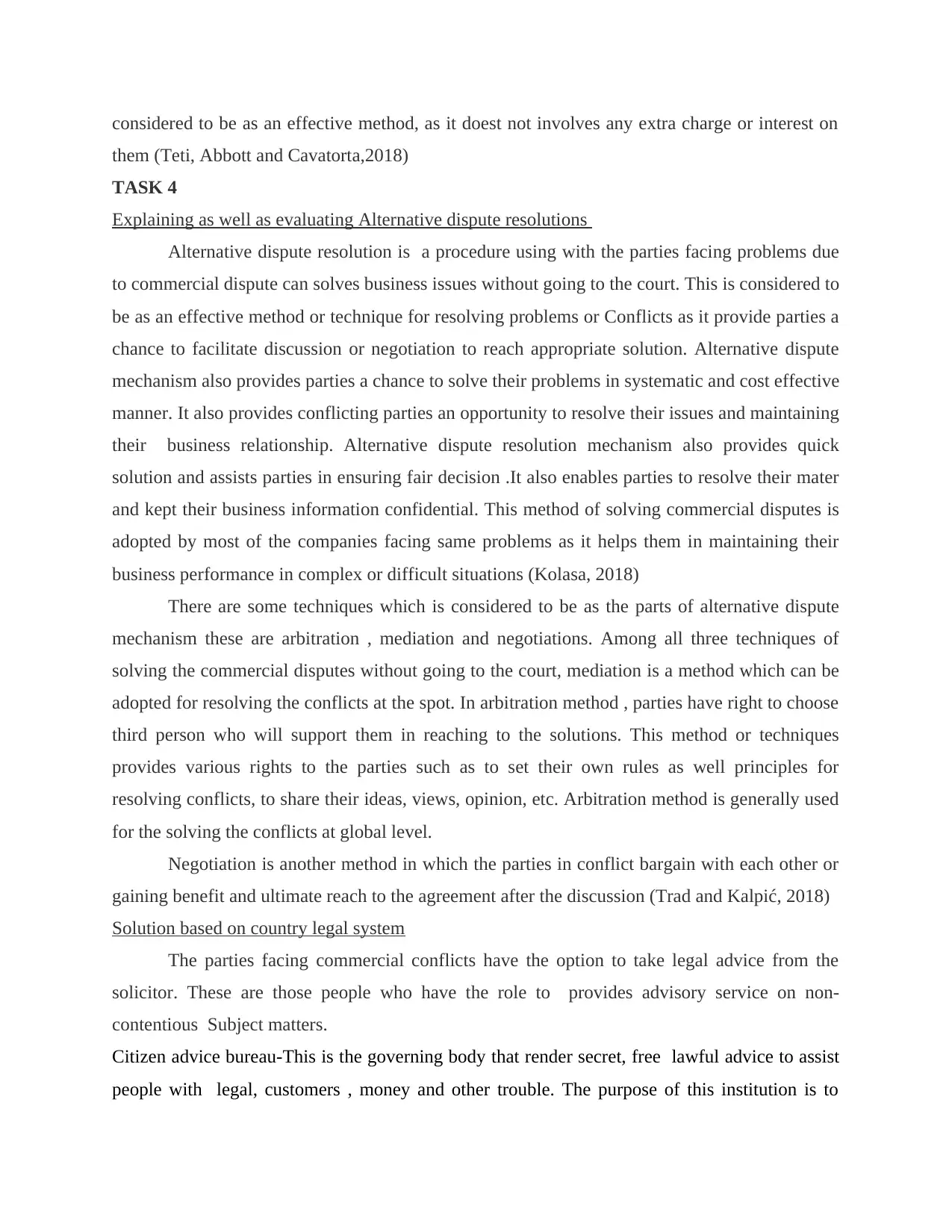
considered to be as an effective method, as it doest not involves any extra charge or interest on
them (Teti, Abbott and Cavatorta,2018)
TASK 4
Explaining as well as evaluating Alternative dispute resolutions
Alternative dispute resolution is a procedure using with the parties facing problems due
to commercial dispute can solves business issues without going to the court. This is considered to
be as an effective method or technique for resolving problems or Conflicts as it provide parties a
chance to facilitate discussion or negotiation to reach appropriate solution. Alternative dispute
mechanism also provides parties a chance to solve their problems in systematic and cost effective
manner. It also provides conflicting parties an opportunity to resolve their issues and maintaining
their business relationship. Alternative dispute resolution mechanism also provides quick
solution and assists parties in ensuring fair decision .It also enables parties to resolve their mater
and kept their business information confidential. This method of solving commercial disputes is
adopted by most of the companies facing same problems as it helps them in maintaining their
business performance in complex or difficult situations (Kolasa, 2018)
There are some techniques which is considered to be as the parts of alternative dispute
mechanism these are arbitration , mediation and negotiations. Among all three techniques of
solving the commercial disputes without going to the court, mediation is a method which can be
adopted for resolving the conflicts at the spot. In arbitration method , parties have right to choose
third person who will support them in reaching to the solutions. This method or techniques
provides various rights to the parties such as to set their own rules as well principles for
resolving conflicts, to share their ideas, views, opinion, etc. Arbitration method is generally used
for the solving the conflicts at global level.
Negotiation is another method in which the parties in conflict bargain with each other or
gaining benefit and ultimate reach to the agreement after the discussion (Trad and Kalpić, 2018)
Solution based on country legal system
The parties facing commercial conflicts have the option to take legal advice from the
solicitor. These are those people who have the role to provides advisory service on non-
contentious Subject matters.
Citizen advice bureau-This is the governing body that render secret, free lawful advice to assist
people with legal, customers , money and other trouble. The purpose of this institution is to
them (Teti, Abbott and Cavatorta,2018)
TASK 4
Explaining as well as evaluating Alternative dispute resolutions
Alternative dispute resolution is a procedure using with the parties facing problems due
to commercial dispute can solves business issues without going to the court. This is considered to
be as an effective method or technique for resolving problems or Conflicts as it provide parties a
chance to facilitate discussion or negotiation to reach appropriate solution. Alternative dispute
mechanism also provides parties a chance to solve their problems in systematic and cost effective
manner. It also provides conflicting parties an opportunity to resolve their issues and maintaining
their business relationship. Alternative dispute resolution mechanism also provides quick
solution and assists parties in ensuring fair decision .It also enables parties to resolve their mater
and kept their business information confidential. This method of solving commercial disputes is
adopted by most of the companies facing same problems as it helps them in maintaining their
business performance in complex or difficult situations (Kolasa, 2018)
There are some techniques which is considered to be as the parts of alternative dispute
mechanism these are arbitration , mediation and negotiations. Among all three techniques of
solving the commercial disputes without going to the court, mediation is a method which can be
adopted for resolving the conflicts at the spot. In arbitration method , parties have right to choose
third person who will support them in reaching to the solutions. This method or techniques
provides various rights to the parties such as to set their own rules as well principles for
resolving conflicts, to share their ideas, views, opinion, etc. Arbitration method is generally used
for the solving the conflicts at global level.
Negotiation is another method in which the parties in conflict bargain with each other or
gaining benefit and ultimate reach to the agreement after the discussion (Trad and Kalpić, 2018)
Solution based on country legal system
The parties facing commercial conflicts have the option to take legal advice from the
solicitor. These are those people who have the role to provides advisory service on non-
contentious Subject matters.
Citizen advice bureau-This is the governing body that render secret, free lawful advice to assist
people with legal, customers , money and other trouble. The purpose of this institution is to
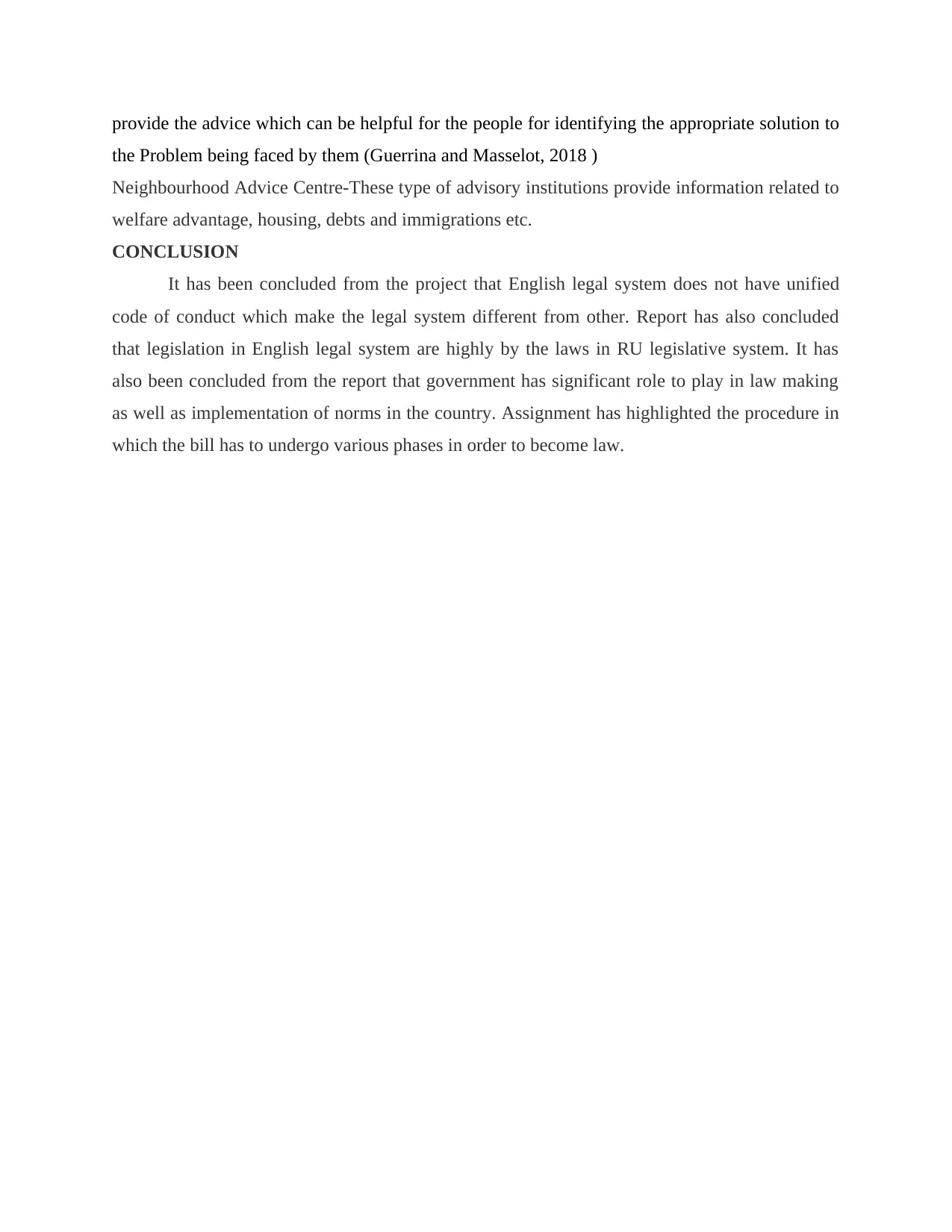
provide the advice which can be helpful for the people for identifying the appropriate solution to
the Problem being faced by them (Guerrina and Masselot, 2018 )
Neighbourhood Advice Centre-These type of advisory institutions provide information related to
welfare advantage, housing, debts and immigrations etc.
CONCLUSION
It has been concluded from the project that English legal system does not have unified
code of conduct which make the legal system different from other. Report has also concluded
that legislation in English legal system are highly by the laws in RU legislative system. It has
also been concluded from the report that government has significant role to play in law making
as well as implementation of norms in the country. Assignment has highlighted the procedure in
which the bill has to undergo various phases in order to become law.
the Problem being faced by them (Guerrina and Masselot, 2018 )
Neighbourhood Advice Centre-These type of advisory institutions provide information related to
welfare advantage, housing, debts and immigrations etc.
CONCLUSION
It has been concluded from the project that English legal system does not have unified
code of conduct which make the legal system different from other. Report has also concluded
that legislation in English legal system are highly by the laws in RU legislative system. It has
also been concluded from the report that government has significant role to play in law making
as well as implementation of norms in the country. Assignment has highlighted the procedure in
which the bill has to undergo various phases in order to become law.
⊘ This is a preview!⊘
Do you want full access?
Subscribe today to unlock all pages.

Trusted by 1+ million students worldwide
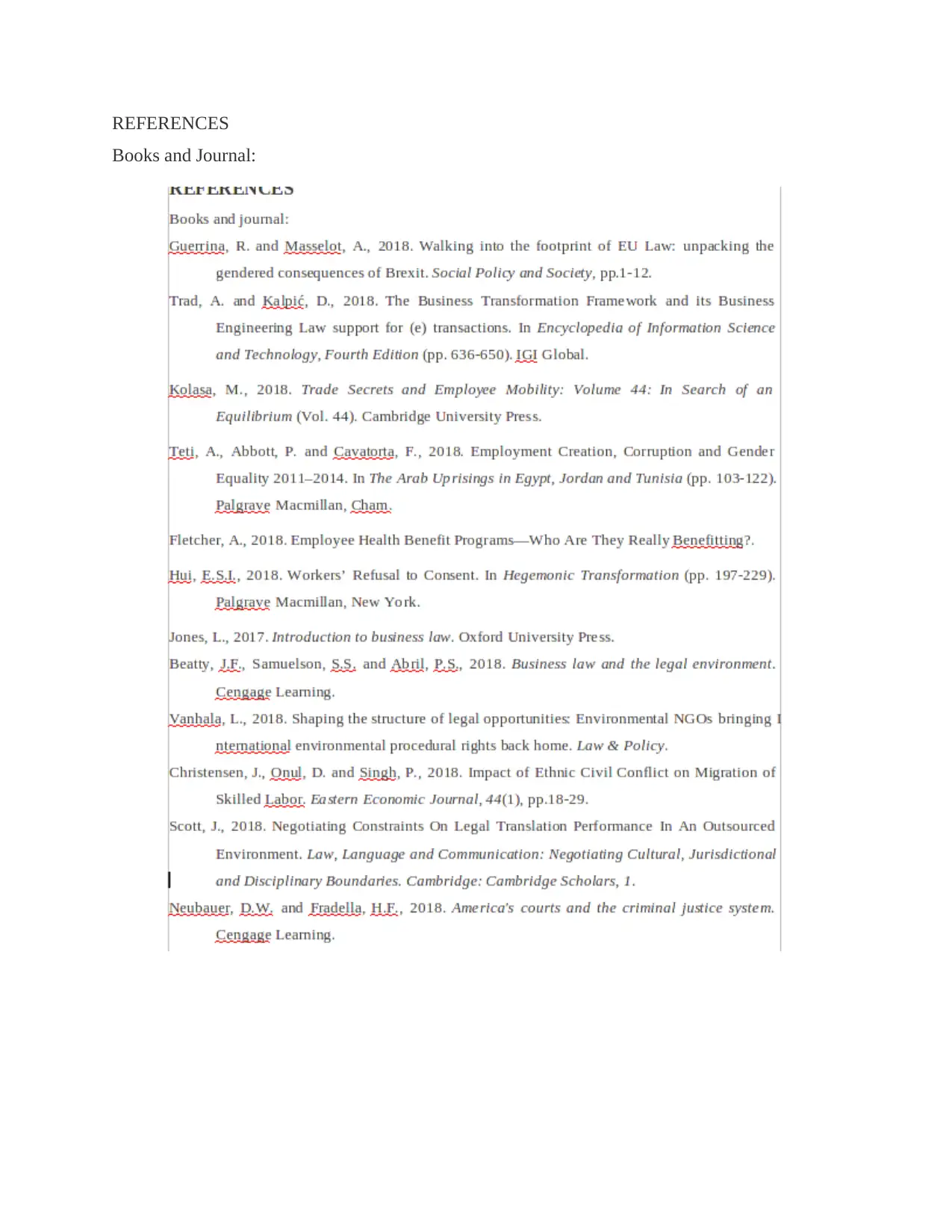
REFERENCES
Books and Journal:
Books and Journal:
1 out of 10
Related Documents
Your All-in-One AI-Powered Toolkit for Academic Success.
+13062052269
info@desklib.com
Available 24*7 on WhatsApp / Email
![[object Object]](/_next/static/media/star-bottom.7253800d.svg)
Unlock your academic potential
Copyright © 2020–2026 A2Z Services. All Rights Reserved. Developed and managed by ZUCOL.





